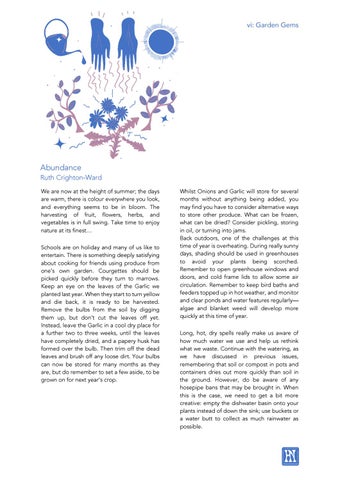vi: Garden Gems
Abundance Ruth Crighton-Ward We are now at the height of summer; the days are warm, there is colour everywhere you look, and everything seems to be in bloom. The harvesting of fruit, flowers, herbs, and vegetables is in full swing. Take time to enjoy nature at its finest… Schools are on holiday and many of us like to entertain. There is something deeply satisfying about cooking for friends using produce from one’s own garden. Courgettes should be picked quickly before they turn to marrows. Keep an eye on the leaves of the Garlic we planted last year. When they start to turn yellow and die back, it is ready to be harvested. Remove the bulbs from the soil by digging them up, but don’t cut the leaves off yet. Instead, leave the Garlic in a cool dry place for a further two to three weeks, until the leaves have completely dried, and a papery husk has formed over the bulb. Then trim off the dead leaves and brush off any loose dirt. Your bulbs can now be stored for many months as they are, but do remember to set a few aside, to be grown on for next year’s crop.
Whilst Onions and Garlic will store for several months without anything being added, you may find you have to consider alternative ways to store other produce. What can be frozen, what can be dried? Consider pickling, storing in oil, or turning into jams. Back outdoors, one of the challenges at this time of year is overheating. During really sunny days, shading should be used in greenhouses to avoid your plants being scorched. Remember to open greenhouse windows and doors, and cold frame lids to allow some air circulation. Remember to keep bird baths and feeders topped up in hot weather, and monitor and clear ponds and water features regularly— algae and blanket weed will develop more quickly at this time of year. Long, hot, dry spells really make us aware of how much water we use and help us rethink what we waste. Continue with the watering, as we have discussed in previous issues, remembering that soil or compost in pots and containers dries out more quickly than soil in the ground. However, do be aware of any hosepipe bans that may be brought in. When this is the case, we need to get a bit more creative: empty the dishwater basin onto your plants instead of down the sink; use buckets or a water butt to collect as much rainwater as possible.
